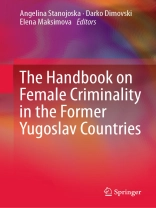This edited volume is the first volume that researches female criminality in the Balkan region and provides insights about patriarchal relations, gender roles, and female criminal behavior. The chapters provide research and data about crimes committed by females in Serbia, North Macedonia, Montenegro, Bosnia and Hercegovina, Croatia, and Slovenia.
The chapters investigate topics such as:
- Long violence
- Social abuse and discrimination Life trajectories towards criminal behavior
- Women facing financial stress and dependence and how it relates to crime
- Women in the criminal justice system
Examining the relationship between crime, gender, and the “modernization” of Balkan (ex-Yugoslavian) social structure, this volume is ideal for interdisciplinary criminology scholars specializing in the Balkans.
Chapter 3 is available open access under a Creative Commons Attribution4.0 International License via link.springer.com
Jadual kandungan
Chapter 1–Introduction.- Chapter 2–Mapping the Experiences of Women Victims / Delinquents in War in The Former Yugoslavia OR Contribution to The Understanding of Women’s History of War.- Chapter 3–Female crime during the armed conflict in Bosnia and Herzegovina.- Chapter 4–Female offenders – Analysis of female criminality in the Republic of Slovenia .- Chapter 5–Gender and Crime in Croatia: Female Criminality in Context.- Chapter 6–Battered woman syndrome in female offenders in Republic of North Macedonia.- Chapter 7–The feminist pathways perspective and general strain theory: A test on female murderers in the Republic of North Macedonia .- Chapter 8–Female Criminality in Republic of Serbia.- Chapter 9–Female criminality in Bosnia and Herzegovina: Crime rates, structure and penalty.- Chapter 10–Criminalization of Women in the Balkans – Case Study of Montenegro .- Chapter 11–Women as practitioners in the criminal justice system: Is there gender balance in the Balkans?.-Chapter 12–Implications and Lessons Learned.
Mengenai Pengarang
Angelina Stanojoska, Ph.D. is an Associate Professor in Criminology and Basic Criminalistics Theory at the Faculty of Law, University “St. Kliment Ohridski” – Bitola, North Macedonia. She graduated from the Police Academy – Skopje (2008), received her MSc in Criminology and Criminalistics (2011) and her Ph.D. in Security Sciences both at the Faculty of Security – Skopje (2014). Professor Stanojoska is a Fulbright Visiting Scholar Alumnae and she finished her postdoctoral research about GST and substance abuse at the Department of Criminology and Criminal Justice at UMSL, USA. Her latest research focuses on the analysis of Agnew’s General Strain Theory and female criminals and inmates, and the feminist pathways perspective analyzed on females who have committed murder.
Darko Dimovski, Ph.D. is a Full Professor in the field of Criminal Law and Criminology at the Faculty of Law, University of Nis. Dimovski was the Head of the Law Clinic atthe Faculty of Law from 2016 to 2019. He teaches undergraduate and graduate courses in areas of Criminology, Victimology, Penology, Legal Gender Studies, Domestic violence, Cybercrime, and more. He was a visiting lecturer in Serbia and abroad in the area of Criminology, as well as in European human rights law, developing a wide network in many academic and research institutions and exchanging knowledge and experience with colleagues from different universities. He has extensive research experience which resulted in a large number of scientific articles in the field of criminal law and human rights, as well as in participation in numerous national and International scientific and conferences.
Elena Maksimova, Ph.D. is an Assistant Professor in Criminal Law and Criminology, and also Vice – Dean for education at the Faculty of Law, University Goce Delcev – Stip. Maksimova has finished her Bachelor, LL.M and Ph.D. Studies at the Faculty of Law “Iustinianus Primus”, St. Cyril and Methodius University in Skopje. From 2012 she was working as a Teaching Assistant at the Faculty of Law, “Goce Delcev” University in Stip, Republic of North Macedonia. She has attended a significant number of conferences, seminars, and training, and has also been included in few projects and has many publications as an author or co-author in national and international journals.












